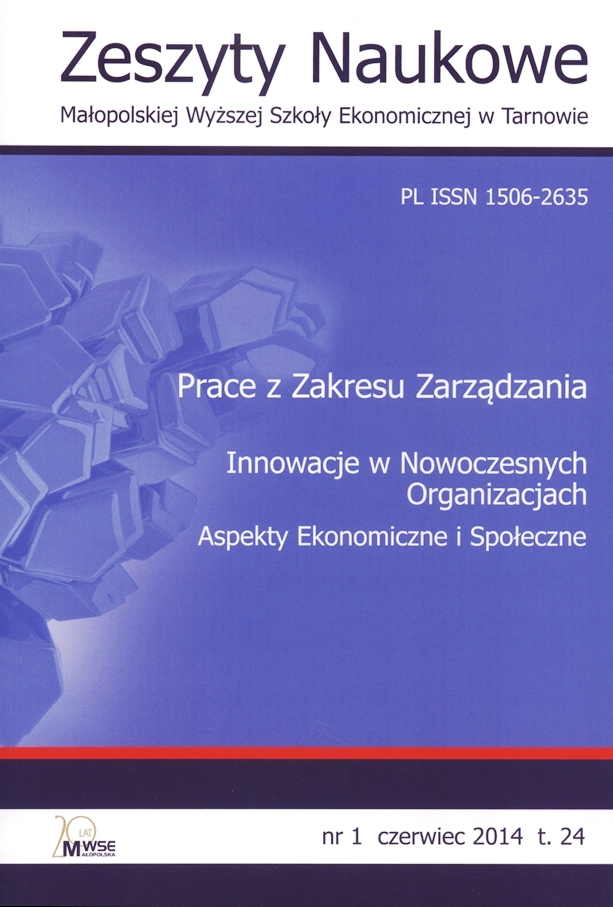Abstract
Considering an increase in innovativeness requires more focus put on the personal aspect of a company, according to the maxim: ‘innovativeness through people’. We found it reasonable to use the Human Resources Management concept to determine action rules and procedures. Particular emphasis was put on high performance work systems (HPWS). High Involvement Work Practices, which are a kind of these systems, were applied to showcase possibilities and directions of the aforementioned actions, meanwhile applying the employee innovative behaviours development formula to interest-oriented management. The presented results of empirical research on employee involvement determiners, including those related to fulfilling their needs, were used to highlight key management practices (pillars). They are fundamental for the HIWP architecture. It was discovered that an individual, comprehensive, contextual and configuration approach has to be taken in formulating them. An increase in innovativeness requires relying on an appropriate configuration of HRM pillars, complimentary to the whereabouts of functioning of an organization.
References
Armstrong, M. (2005). Zarządzanie zasobami ludzkimi. Kraków: Oficyna Ekonomiczna. ISBN 83-89355-88-4.
View in Google Scholar
Bielski, M. (2002). Podstawy teorii organizacji i zarządzania. Warszawa: C.H. Beck. ISBN 83-7247-045-6.
View in Google Scholar
Borkowska, S. (red.) (2010). Rola ZZL w kreowaniu innowacyjności organizacji. Warszawa: C.H. Beck. ISBN 978-83-255-1598-0.
View in Google Scholar
Gableta, M. (red.) (2012). Interesy pracowników oraz warunki ich respektowania w przedsiębiorstwach. Wrocław: Wydawnictwo Uniwersytetu Ekonomicznego we Wrocławiu. ISBN 978-83-7695-146-1.
View in Google Scholar
Gableta, M., Adamska, M. (2009). Kształtowanie procedury uwzględniania interesów pracowniczych w procesie gospodarowania. W: M. Gableta, A. Pietroń-Pyszczek (red.). Człowiek i praca w zmieniającej się organizacji. Prace Naukowe, nr 43. Wrocław: Wydawnictwo Uniwersytetu Ekonomicznego we Wrocławiu. ISBN 978-83-7011-956-0.
View in Google Scholar
Gableta, M., Bodak, A. (2012). Skłonność pracodawców do respektowania interesów pracowników (wyniki badań empirycznych). Organizacja i Kierowanie, 1A(149), 287–296.
View in Google Scholar
Gruszecki, T. (2002). Współczesne teorie przedsiębiorstwa. Warszawa: Wydawnictwo Naukowe PWN. ISBN 83-01-13612-X.
View in Google Scholar
Juchnowicz, M. (2010). Zarządzanie przez zaangażowanie. Koncepcje, kontrowersje, aplikacje. Warszawa: PWE. ISBN 978-83-208-1884-0.
View in Google Scholar
Kożusznik, B. (2010). Kluczowa rola psychologii we wspieraniu i stymulowaniu innowacyjności. T. 2(35). Katowice: Wydawnictwo Chowanna. ISSN 0137-706X.
View in Google Scholar
Krzyżanowski, L. (1999). O podstawach kierowania organizacjami inaczej. Warszawa: Wydawnictwo Naukowe PWN. ISBN 83-01-12741-4.
View in Google Scholar
Morgan, G. (1999). Obrazy organizacji. Warszawa: Wydawnictwo Naukowe PWN. ISBN 83-01-12235-8.
View in Google Scholar
Snell, S., Bohlander, G. (2011). Managing Human Resources. Mason: South-Western. ISBN 978-1-111-53282-6.
View in Google Scholar
Wojtczuk-Turek, A. (2012). Zachowania innowacyjne w pracy. Wybrane zagadnienia teoretyczne i praktyczne. Warszawa: Difin. ISBN 978-83-7641-689-2.
View in Google Scholar
Yuan, F., Woodman, R.W. (2010). Innovative behavior in the workplace: the role of performance and image outcome expectations. Academy of Management Journal, 53(2), 323–342.
View in Google Scholar
© Copyright by Małopolska School of Economics in Tarnów. The articles are available under the Creative Commons Attribution NonCommercial-NoDerivatives 4.0 International License


